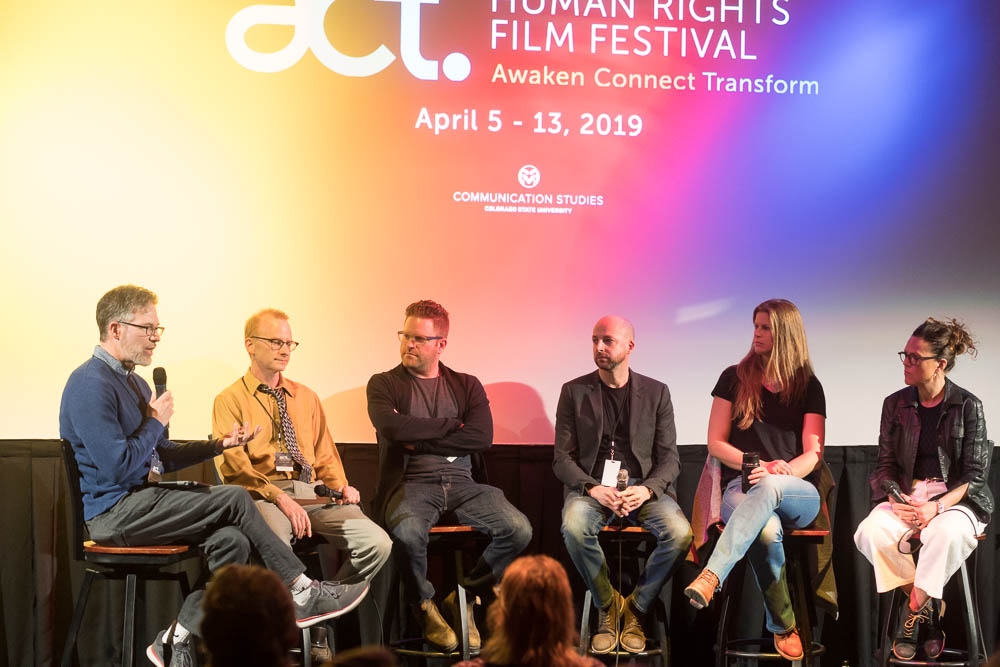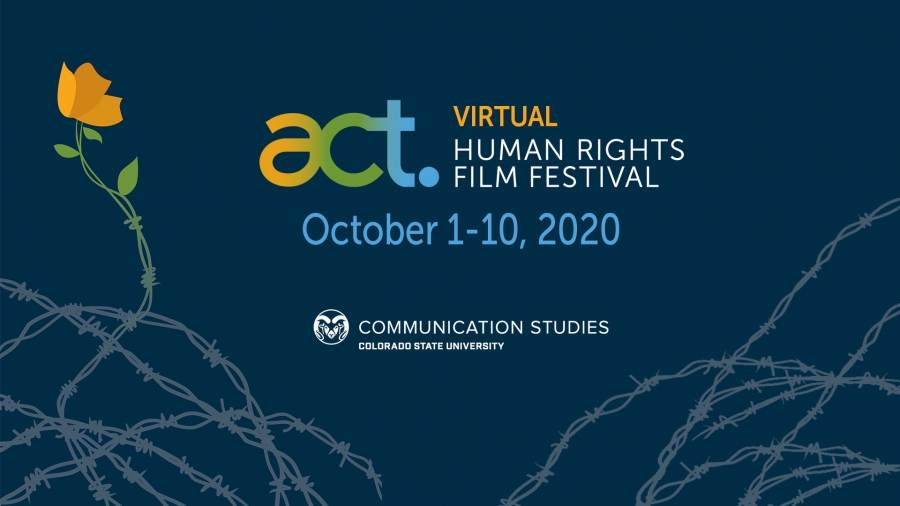Written by Tasnia Habib
The ACT Human Rights Film Festival opened virtually on October 1st and will be running through October 10th. The ACT Human Rights Film Festival takes place in Ft. Collins, Colorado, based out of Colorado State University. The festival screens films that fosters conversations about social justice and human rights.
“We are excited to celebrate our fifth year and present a full slate of films that inspire and empower us on our new digital platform,” ACT Managing Director Beth Seymour said in a press release. “While we are all doing our part to stay home and be safe, ACT is thrilled to convene community and sustain conversations around human rights and social justice. Audience members from throughout the United States can join us for film screenings and conversations with filmmakers.”
ACT is featuring 21 films and 13 conversations with filmmakers that were selected from 200 titles released and submitted over the past year. The theme of this year’s festival is “Connecting at the intersection of culture, art and social justice.” All of the feature films have a filmmaker or film subject participating in either live or pre-recorded conversations that will air after the screening of their films.
ACT was originally scheduled in April and was cancelled due to COVID-19, when the University, state and city had all shut down. In the interim, Managing Director Beth Seymour still wanted to keep the audience engaged, without increasing financial burden for the audience. “The conversations are a critical part of our festival,” said Seymour.

Colorado State University Communication Studies professor Scott Diffrient moderates a panel discussion with Aaron Burns, Matthew Shoychet, Andrew McConnell, Tahria Sheather and Irene Taylor Brodsky at CSU’s ACT Human Rights Film Festival at the Lyric Theatre, April 6, 2019.
Many of the films selected for the original festival in April were available online for free. ACT paid filmmakers an honorarium for a live Q&A that was uploaded online. Seymour said the events were well-received with many participants who stated they felt connected to the festival. These virtual events also allowed ACT to expand their reach to a wider audience that wouldn’t have been able to participate otherwise. Some of these events can still be viewed at the ACT at Home website.
During the shutdown, Seymour said that ACT regularly participated in webinars held by the Film Festival Alliance and other organizations, which allowed film festivals to come together. “Perhaps one of the best things to come out of the shutdown is that film festivals are trying to talk to each other and collaborate,” said Seymour. Some of these events include professional development events, discussions about drive-in screenings and fundraising in the time of COVID-19.
Seymour said that the films ACT screens and the discussions around the films will help bring important issues to the forefront. “Film is an incredibly powerful tool to shed a light and bring stories to audiences that may not have access to [them],” said Seymour. ACT also pairs their films with a non-profit or an activist organization that is currently taking action around that topic. “We are connecting people to actionable items,” said Seymour. A list of these organizations can be found here: https://actfilmfest.colostate.edu/call-to-act/.
Below are some films to check out during the festival. The full program can be viewed online at actfilmfest.colostate.edu.
Shadow Flowers w/ Q & A with Director
109 min., Documentary Feature
Director: Seung-Jun Yi
Logline: Approximately 33,000 North Korean defectors currently live in South Korea, many of them having fled their homeland in search of food, freedom, and a better life. However, several people whose families remain north of the Demilitarized Zone (DMZ) have experienced not only separation anxiety (being far removed from husbands, wives, children, etc.) but also culture shock, discrimination, and unemployment upon relocating to a fiercely competitive, capitalistic society. Directed by the Oscar-nominated documentarian Yi Seung-jun (a guest of the ACT Human Rights Film Festival during its first year), Shadow Flowers is an eye-opening film that follows the everyday travails of a middle-aged North Korean woman, Kim Ryun-hee, who “accidentally” defected to South Korea but whose express intention was to go back home once she had saved up enough money for her medical treatment in China. Little did she know that her open acknowledgment of that plan, which was made known to South Korean authorities, would put her on the government’s watch list, making such clandestine efforts impossible. By contrasting Kim’s mounting despair with her family’s small moments of happiness in the socialist North, Yi’s remarkably complex, nuanced film forces audiences to broaden their understanding of human rights in a part of the world that remains at least partially hidden in the proverbial “shadows
Prison for Profit w/ Q & A with Director
83 min., Documentary Feature
Director: Ilse van Velzen and Femke van Velzen
Logline: This Dutch production provides an eye-opening look at the human costs of prison privatization, giving former inmates, security guards, and other staff at the Mangaung Prison an opportunity to shed light on a type of rights violation that has largely been underreported by the mainstream press. Directed with methodical rigor by the filmmaking sisters Ilse van Velzen and Femke van Velzen, and following the whistleblowing efforts of investigative journalist Ruth Hopkins to uncover prisoner abuse within South Africa’s first privately run penitentiary (located, ironically, in the province of Free State), Prison for Profit makes the persuasive case that cost-cutting measures on the part of G4S — a British multinational security firm headquartered in London — has created a system of commercialized incarceration in which inmates are exploited as workers and the process of rehabilitation has been outsourced to corporations with little regard for the sanctity of life. The van Velzens weave together heartrending conversations with ex-warders of Manguang, who express guilt over their role in implementing violent forms of torture in order to extract information from prisoners, and leaked surveillance video footage of the latter being beaten and subjected to electroshock. Though difficult to watch, such graphic scenes (including those of young men showing their scars to the camera and discussing their permanent injuries, including dislocated spinal cords) are essential components of the codirectors’ chosen form of mediated truth-telling. In other words, they are as necessary for audiences to witness as any self-incriminating testimony on the part of those profit-driven companies for whom criminality represents an opportunity not to reform convicts but to increase earnings and stock value from their perpetual subjugation.
A Line Birds Cannot See
9 min., Shorts Program
Director: Amy Bench
Logline: E.L. never imagined she would leave her tiny village high in the mountains of Guatemala, but when her mother got up the strength to flee a violent home, she was thrust into a journey that would forever change her. After a smuggler separated them, E’s life honed to a single goal—surviving so she could find her mother again. In the animated short film ‘A Line Birds Cannot See,’ E.L tells her story of coming to the US as an unaccompanied minor in 2006.
Gay Chorus Deep South w/ Q & A with Director
92 min., Documentary Feature
Director: David Charles Rodrigues
Logline: Gay rights activists have made tremendous strides in nudging state legislators and voters toward more progressive stances on issues that impact the lives of millions of Americans. However, throughout the Bible Belt region, where there is strong opposition to same-sex marriage, members of the LGBTQ community continue to fight against laws that essentially license discrimination (for instance, a bill in Mississippi, under the guise of religious freedom, allows businesses to turn away potential customers based on their gender identity or sexual orientation). As the son of a Southern Baptist pastor from Texas, Tim Seelig, who today is the conductor of the San Francisco Gay Men’s Chorus, knows from experience how difficult it can be to replace misguided hatred with compassion and understanding; especially now, when the ideological rift between the U.S.’s two major political parties appears to be widening and right-wing leaders and other elected officials promote intolerance while reversing the progress made under earlier presidential administrations. He along with 300 other singers (from his own choral group as well as the Oakland Interfaith Gospel Choir) take their message of love on tour, to churches and concert halls in the Deep South — an ultimately cathartic opportunity for personal healing that brings many of them face-to-face with long-estranged family members whose hearts are slowly opening to the idea of having a gay son. Directed by David Charles Rodrigues, Gay Chorus Deep South follows Seelig and his gospel-singing cohort on their week-long journey, in the process revealing how efforts to build unity might be regarded as condescending or paternalistic by those on the receiving end of such goodwill gestures; especially individuals, such as queer historian John Burford, who do not fit the stereotype of bigotry so central to the cultural imaginary of Southerners as rural, homophobic racists.

